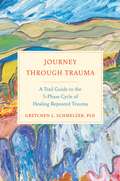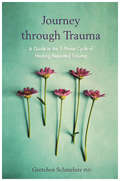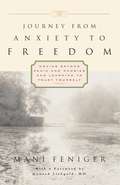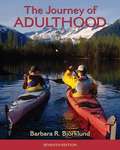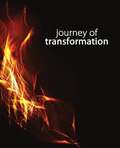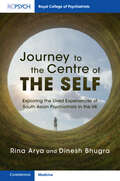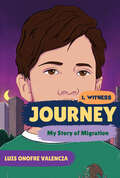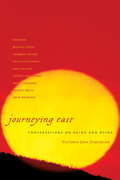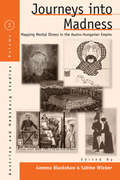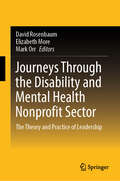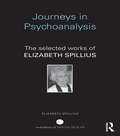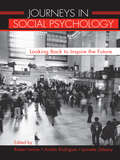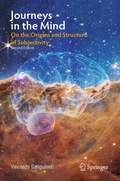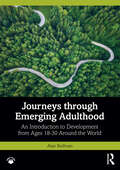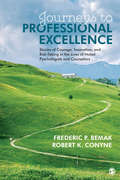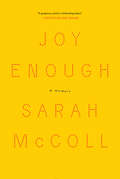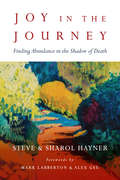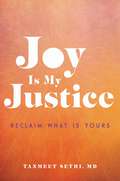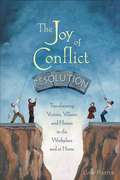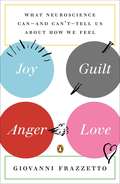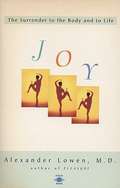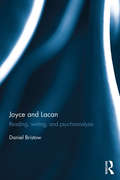- Table View
- List View
Journey Out of Silence
by Dora Tingelstad WeberThe author encourages those who are not hearing-impaired to increase their sensitivity to those who are.
Journey Through Trauma: A Trail Guide to the 5-Phase Cycle of Healing Repeated Trauma
by Gretchen L. SchmelzerFor survivors of PTSD and repeated, relational trauma -- and the people who love them.Gretchen Schmelzer watched too many people quit during treatment for trauma recovery. They found it too difficult or too frightening or just decided that for them it was too late. But as a therapist and trauma survivor herself, Dr. Schmelzer wants us to know that it is never too late to heal from trauma, whether it is the suffering caused within an abusive relationship or PTSD resulting from combat. Sometimes what feels like a big setback is actually an unexpected difficult step forward. So she wrote Journey Through Trauma specifically for survivors--to help them understand the terrain of the healing process and stay on the path. There are three basic principles that every trauma survivor should know: Healing is possible. It requires courage. And it cannot be done alone. Traumas that happen more than once--child abuse, sexual abuse, domestic violence, gang violence, even war--are all relational traumas. They happened inside a relationship and therefore must be healed inside a relationship, whether that relationship is with a therapist or within a group. Journey Through Trauma gives us a map to help guide us through that healing process, see where the hard parts show up, and persevere in the process of getting well. We learn the five phases that every survivor must negotiate along the way and come to understand that since the cycle of healing is not linear, circling back around to a previous stage does not mean defeat - it actually means progress as well as facing new challenges. Authoritative and accessible, Journey Through Trauma provides support for survivors and their loved ones through one of the most challenging but necessary processes of healing that anyone can face.
Journey Through Trauma: A Trail Guide to the 5-Phase Cycle of Healing Repeated Trauma
by Gretchen SchmelzerAs a therapist, Gretchen Schmelzer has watched far too many people quit during treatment for trauma recovery. They find it too difficult or frightening, or they decide that it's just too late for them. Schmelzer wrote Journey Through Trauma specifically for survivors to help them understand the terrain of the healing process and stay on the path.She begins by laying out three important assumptions that support a survivor's healing: that it is possible, that it requires courage and that it cannot be done alone. Traumas that happen more than once - child abuse, sexual abuse, domestic violence, gang violence, war - are all relational traumas. They are traumas that happen inside a relationship and therefore must be healed inside a relationship, whether that relationship is with a therapist or within a group. She then guides readers through the five phases that every survivor must negotiate: Preparation, Unintegration, Identification, Integration and Consolidation. She creates a mental map of the healing process that helps survivors recognize where they are in their journey to health, see where the hard parts occur and persevere in the process of getting well. Since the cycle of healing repeated trauma is not linear, the survivor comes to understand that circling back around to a previous stage actually means progress as well as facing new challenges. Ultimately, the healing journey is one of trust, as survivors come to trust their capacity to rely on help from others and to trust themselves and the work they have done.
Journey from Anxiety to Freedom: Moving Beyond Panic and Phobias and Learning to Trust Yourself
by Mani Feniger"By revealing her own story, Mani Feniger reminds us that our biggest fear can become our most profound teacher."--Geneen Roth, bestselling author of When Food is LoveYour heart pounds, palms sweat, eyes blur, breathing becomes difficult, and you feel dizzy or disoriented. You're in a panic, even though there is no apparent danger. Every year millions of people suffer from anxiety disorders--now the number one mental health issue among women, and second only to substance abuse among men. In her new book, Journey from Anxiety to Freedom, author Mani Feniger shares her own struggle with panic and phobias, taking the readers on a journey from her terrifying first panic attack, to her renewed confidence driving across bridges, flying in airplanes, and finally taking a long-desired trip abroad. Readers may identify with her story and the vivid descriptions of seven other men and women whose lives were once compromised by fear. Anxiety sufferers will emerge with practical tools and motivation, knowing that others like themselves have faced their worst fears, and now live with peace of mind. By sharing the inspiring stories of diverse people, including Howard Liebold, M.D., who wrote the foreword, Journey from Anxiety to Freedom calmly walks readers through: ·Uncovering their own anxiety secrets ·Finding their turning points ·Designing their own program for healing ·Practicing exercises and meditations ·Developing skills and attitudes that promote trustFrom the Trade Paperback edition.
Journey of Adulthood (Seventh Edition)
by Barbara R. BjorklundThe book captures the dynamic process of adult development from early adulthood to the end of life. Its core is made up of research findings from large-scale projects and major theories of adult development.
Journey of Transformation
by John Ranieri Peter SavastanoThe aim of this book is to get the reader, to consider certain questions about what makes for a worthwhile life.
Journey to the Centre of the Self: Exploring the Lived Experiences of South Asian Psychiatrists in the UK
by Dinesh Bhugra Rina AryaThis book presents previously untold narratives of South Asian psychiatrists in the UK and provides insight into the significance of cultural identity, migration and marginalisation on their lives and work. The development of cultural psychiatry arose to meet the needs of multiethnic populations. A hitherto overlooked area in the field is the impact of white privilege on psychiatrists from ethnic minority backgrounds. Through the lived experience of South Asian psychiatrists, this pioneering book delves into the effects of structural inequality, the culturally specific needs of South Asian populations, and the impact of migration across generations. Personal accounts impart the importance of recognising the cultural hybridity of ethnic identities and how to work within cultural frameworks. Set in the UK context, findings can be applied more widely to other diaspora settings and are critical in understanding contemporary insights into cultural psychiatry and diverse cultural environments.
Journey: My Story of Migration (I, Witness #0)
by Luis Onofre ValenciaA young writer opens a window for young readers on his experiences crossing the US/Mexico border and his life as an undocumented immigrant. When Luis Onofre Valencia was five years old, his father lost his business and was forced to leave Mexico for the United States to find work. Devastated, Luis and his family struggled to keep afloat. When his father asked them to join him in the US, Luis journeyed by truck for several weeks, separate from his family members, who traveled on foot. When the family reunited in Anaheim, Luis faced an entirely new struggle: adapting to a new city and a new culture that did not look kindly on him. With a voice that is both accessible and engaging, Luis brings forward an empowering first-person account of a young man finding strength in his identity, and using this strength to become a community leader, a police intervention activist, and an advocate for mental health.
Journeying East
by Victoria DimidjianSome of the West's foremost spiritual teachers share their thoughts on aging and the end of life process. Comprehensive and original interviews with Ram Dass, Michael Eigen, Norman Fischer, Joan Halifax, Thich Nhat Hanh, Sister Ch,n KhÙng, Frank Ostaseski, Rodney Smith, and John Wellwood provide new perspectives and offer comfort and support. This accessible, thought-provoking, and unique book is an invaluable resource for individuals, classrooms, hospice or home care settings, and for anyone who has experienced the loss of a loved one.Journeying East also features a comprehensive resources section with an annotated bibliography, guidelines for general reading and study, information on the training of hospice employees and volunteers, and suggested at-home activities.Victoria Jean Dimidjian is professor of education at Florida Gulf Coast University. She began her study of Buddhism at the Zen Studies Society in Manhattan in 1974 and is a founding member of the Naples Community of Mindfulness."An important and life-changing book." --Diane Cox, CEO, Hospice of Naples, FL
Journeys Into Madness: Mapping Mental Illness in the Austro-Hungarian Empire (Austrian and Habsburg Studies #14)
by Gemma Blackshaw Sabine WieberAt the turn of the century, Sigmund Freud's investigation of the mind represented a particular journey into mental illness, but it was not the only exploration of this 'territory' in the Austro-Hungarian Empire. Sanatoriums were the new tourism destinations, psychiatrists were collecting art works produced by patients and writers were developing innovative literary techniques to convey a character's interior life. This collection of essays uses the framework of journeys in order to highlight the diverse artistic, cultural and medical responses to a peculiarly Viennese anxiety about the madness of modern times. The travellers of these journeys vary from patients to doctors, artists to writers, architects to composers and royalty to tourists; in engaging with their histories, the contributors reveal the different ways in which madness was experienced and represented in 'Vienna 1900'.
Journeys Through the Disability and Mental Health Nonprofit Sector: The Theory and Practice of Leadership
by David Rosenbaum Elizabeth More Mark OrrThis book is about leadership in nonprofit disability and mental health service organisations. It is focused on providing both an academic and a practitioner view of what leadership should look like in this sector and what are the various leadership attributes and skills acquisitions that will guide successful leadership in an array of situations and circumstances. It achieves this dual focus through the detailed analysis of leadership issues across a wide range of relevant topics and issues that centre on academic analysis interspersed with appropriate and relevant sector practice-related examples. In this manner, the book will be of interest to both academics in a range of management-related and disability fields, as well as to practitioners seeking guidance and input on issues pertinent to their own organisation, recognising that all organisations, irrespective of sectors, are able to learn from each other. Additionally, higher education students involved in nonprofit leadership subjects and courses seeking further research in this area to support their studies will also find this book a valuable resource for their studies. An analysis of industry practice is presented following detailed interviews with key executive staff from nonprofit disability and mental health service organizations. This analysis of interviews is presented in a manner that supports and reinforces the academic details presented in the preceding chapters. In this way theory and practice become integrated. This linkage will enable theory to be augmented by real world organizational activities and experiences from key organizational players. This book contains a wealth of academic research-based information on a broad range of topics that represent issues and challenges faced by all CEOs within nonprofit disability and mental health service organizations.
Journeys in Psychoanalysis: The selected works of Elizabeth Spillius (World Library of Mental Health)
by Elizabeth SpilliusSpanning six decades, this collection, Journeys in Psychoanalysis: The selected works of Elizabeth Spillius, traces the arc of her career from anthropology and entering psychoanalysis ‘almost by accident’, to becoming one of her generation’s leading scholars of Melanie Klein. Born in 1924 in Ontario, Canada, Elizabeth arrived at the London School of Economics for postgraduate studies in the 1950s and soon embarked on a groundbreaking study of family life in the East End of London that produced a PhD and her first book, Family and Social Network, under her maiden name Elizabeth Bott. Published by the Tavistock Institute in 1957, it remains one of the most influential works published on the sociology of the family. These papers are a testament to the luminous intellect and understated compassion that Elizabeth has always brought to her work. They vividly map not just the evolution of Elizabeth’s career but the development of Melanie Klein’s thought, often drawing in compelling fashion on the writer’s own experiences with her patients. Each is written with the clarity and concision that makes difficult concepts eminently comprehensible to psychoanalysts, psychoanalytic psychotherapists and laymen alike.
Journeys in Social Psychology: Looking Back to Inspire the Future
by Robert Levine Aroldo Rodrigues Lynnette ZeleznyThis volume consists of personal narrative accounts of the career journeys of some of the world's most eminent social psychologists. Each contributing psychologist is an esteemed scholar, an excellent writer, and has a story to tell. Together, the contributions cover a time range from Morton Deutsch to today, and touch upon virtually every important movement and person in the history of academic social psychology. This book provides a fascinating insight into the development of outstanding academic careers and will be a source of inspiration to seasoned researchers and beginning students alike, in the fields of social psychology, history of psychology, and beyond.
Journeys in the Mind: On the Origins and Structure of Subjectivity
by Vincenzo SanguinetiThis book presents a systematic exploration of the subjective experience, keeping the investigation for the most part within a subjective first person perspective through the use of “vignettes” as sources of data. It also uses incorporates a ‘"third person” objective approach when that is relevant. The goal of Journeys in the Mind is to capture and convey the operations of the mind: both the shared blueprints common to the elaboration of subjective knowledge as well as the immense fishnet of personalized variables that operate in each mental phase-space and act upon the blueprints to continuously recategorize them into sets of coherent, dynamic outcomes, or mental landscapes. Dr. Sanguineti's meditative perspective holds the promise to enrich the way we understand the workings of the human mind.
Journeys through Emerging Adulthood: An Introduction to Development from Ages 18-30 Around the World
by Alan ReifmanJourneys through Emerging Adulthood takes the reader on a tour of contemporary transitions to adulthood, reporting on the latest cross-national and cross-cultural research into young adulthood and separating fact from fiction about this important life phase. Alan Reifman shows how today’s youth are taking more time to enter traditional adult roles, and explores the benefits and disadvantages of this gradual emergence into adulthood. This essential textbook navigates the research that reveals the substantial variety in young people’s paths to adulthood. It covers the spectrum of the young adult experience, examining the influence that parents have on their grown children’s progress and identity as adults, and considering the impact of traditional milestones such as higher education, establishing a career, forming romantic relationships and becoming a parent. It examines key topics including mental health in emerging adults and the likelihood of substance abuse, and how young adults might reach out into the community through volunteerism, religious involvement and political activism. Each section includes examples and studies conducted in a range of countries, exploring how the journey to adulthood can vary according to cultural context as well as individual circumstance. The book affirms that while there is great variety in how one transitions to adulthood, there is no correct path, and most people fare well – or even thrive – in adulthood. Featuring end-of-chapter summaries, quizzes and activities, Journeys Through Emerging Adulthood provides an accessible yet comprehensive overview of this significant life stage, connecting fundamental psychological theories with modern social phenomena. Reifman’s text is essential reading for both undergraduate and graduate students of psychology, human development and sociology, as well as students and researchers of any discipline interested in the path to adulthood.
Journeys to Professional Excellence
by Robert K. ConyneThis book is about the professional experience of 15 counselors, educators, and practitioners.
Journeys to Professional Excellence: Stories of Courage, Innovation, and Risk-Taking in the Lives of Noted Psychologists and Counselors
by Robert K. Conyne Frederic P. BemakJourneys to Professional Excellence: Stories of Courage, Innovation, and Risk-Taking in the Lives of Noted Psychologists and Counselors edited by Frederic P. Bemak and Robert K. Conyne explores the professional journeys of well-known psychologists and counselors, examining factors that contributed to their successes and struggles in the field. Powerful narratives cover the challenges and joys related to ethnic identity; moving from poverty; finding significance; dealing with immigrant status; exploring public policy; challenging the status quo; experiencing serendipity and exploring one’s way; moving into new professional roles; and taking risks. These stories will ignite passion in future psychologists and counselors by helping them reflect on the relationship between their own personal and professional identities.
Journeys to Professional Excellence: Stories of Courage, Innovation, and Risk-Taking in the Lives of Noted Psychologists and Counselors
by Robert K. Conyne Frederic P. BemakJourneys to Professional Excellence: Stories of Courage, Innovation, and Risk-Taking in the Lives of Noted Psychologists and Counselors edited by Frederic P. Bemak and Robert K. Conyne explores the professional journeys of well-known psychologists and counselors, examining factors that contributed to their successes and struggles in the field. Powerful narratives cover the challenges and joys related to ethnic identity; moving from poverty; finding significance; dealing with immigrant status; exploring public policy; challenging the status quo; experiencing serendipity and exploring one’s way; moving into new professional roles; and taking risks. These stories will ignite passion in future psychologists and counselors by helping them reflect on the relationship between their own personal and professional identities.
Joy Enough: A Memoir
by Sarah McCollFrom a bracing new voice comes this life-affirming memoir of a daughter making and remaking her life in her mother’s image. Sifting gingerly through memories of her late mother, brilliant newcomer Sarah McColl has penned an indelible tribute to the joy and pain of loving well. Even as her own marriage splinters, McColl drops everything when her mother is diagnosed with cancer, returning to the family farmhouse and laboring over elaborate meals in the hopes of nourishing her back to health. In a series of vibrant vignettes—lipstick applied, novels read, imperfect cakes baked—McColl reveals a woman of endless charm and infinite love for her unruly brood of children. Mining the dual losses of both her young marriage and her beloved mother, McColl confronts her identity as a woman, walking lightly in the footsteps of the woman who came before her and clinging fast to the joy she left behind. With candor reminiscent of classics like C. S. Lewis’s A Grief Observed, Joy Enough offers a story that blooms with life.
Joy in the Journey: Finding Abundance in the Shadow of Death
by Steve Hayner Sharol HaynerHearts Minds Bookstore's Best Books of 2015, Memoir Steve Hayner was serving as president of Columbia Seminary and was healthy and fit when he found out he had terminal pancreatic cancer. He and his wife, Sharol, embarked on a journey together with their children that soon included tens of thousands of visits from friends and acquaintances via the CaringBridge website. The overwhelming response to their posts on this website attested to the surprising and engaging way that they chose to live in the face of death. As a result they uncovered the remarkable truth that God, our good Shepherd, provides a feast for us when we are in the valley of the shadow of death as well as in the green pastures. Steve was always known for signing letters and emails, "joyfully." These pages, including reflections from some of those closest to Steve and Sharol, offer us a hope-filled glimpse into what it means to walk with God in honesty, with joy, even through great pain.
Joy is My Justice: Reclaim What Is Yours
by Tanmeet SethiReclaim your joy and personal power and find healing in this radical guide to powerful stories and meditations rooted in neuroscience. If you think finding Joy is "too hard, too much to hope for," or only for people who are &“resilient enough,&” if you&’ve been made to feel broken or that your pain is your fault, here is a radical guide that will open you to the potential of healing, rooted in powerful stories, potent guided exercises and meditations, and neuroscience. In Joy Is My Justice, Integrative Medicine Physician and activist Tanmeet Sethi shares her methods for shifting your nervous system and biochemistry into Joy at the cellular level. You can reclaim Joy—as you reclaim your personal power, strength, and purpose—despite the burden of living in an unjust world, despite past traumas, and despite what a whitewashed wellness world says about your capacity to do so. Everyone alive will endure great pain—multiple times and usually beyond your control. An invitation to everyone whom "wellness" has left behind, Joy Is My Justice will help you rediscover your Joy, not as a destination or solution but as a profound practice for healing. Every footstep you take toward Joy is a radical act of Justice.
Joy of Conflict Resolution
by Gary HarperThe rapid rate of change in the workplace and among families often leads to conflict and confrontation which can undermine productivity and poison relationships. The Joy of Conflict Resolution helps readers understand conflict and why it arises through the lens of the "drama triangle" of victims, villains and heroes. In an accessible, engaging and light-hearted style that uses stories and humor to explore potentially emotionally charged situations, it provides proven and practical skills to move beyond confrontation to resolve conflicts collaboratively.
Joy, Guilt, Anger, Love
by Giovanni FrazzettoIs science ever enough to explain why we feel the way we feel? In this engaging account, renowned neuroscientist Giovanni Frazzetto blends cutting-edge scientific research with personal stories to reveal how our brains generate our emotions. He demonstrates that while modern science has expanded our knowledge, investigating art, literature, and philosophy is equally crucial to unraveling the brain’s secrets. What can a brain scan, or our reaction to a Caravaggio painting, reveal about the deep seat of guilt? Can ancient remedies fight sadness more effectively than antidepressants? What can writing poetry tell us about how joy works? Structured in seven chapters encompassing common human emotions-anger, guilt, anxiety, grief, empathy, joy, and love-Joy, Guilt, Anger, Love offers a way of thinking about science and art that will help us to more fully understand ourselves and how we feel. .
Joy: The Surrender to the Body and to Life
by Alexander LowenDr. Alexander Lowen believes that the key to personal change is contact with the body. This book rests on the idea that joy is a natural state, a positive feeling of the body, possible only through surrender to the body by listening to its wisdom and what it communicates. The book reviews the essentials of bioenergetic therapy in the light of other therapeutic approaches, and teaches how to surrender to joy by using bioenergetic principles. It discusses aggression, disappointment, sexual abuse, the fear of dying and issues of spirituality as it attempts to make joy a more common experience.
Joyce and Lacan: Reading, Writing and Psychoanalysis
by Daniel BristowWhat happens when the intellectual giant of twentieth-century literature, James Joyce, is made an object of consideration and cause of desire by the intellectual giant of modern psychoanalysis, Jacques Lacan? This is what Joyce and Lacan explores, in the three closely interrelated areas of reading, writing, and psychoanalysis, by delving into Joyce’s own relationship with psychoanalysis in his lifetime. The book concentrates primarily on his last text, Finnegans Wake, the notorious difficulty of which arises from its challenging the intellect itself, and our own processes of reading. As well as the centrality of the Wake, concepts of Joycean ontology, sanity, singularity, and sexuality are excavated from sustained analysis of his earliest writings onward. To be ‘post-Joycean’, as Lacan describes it, means then to be in the wake not only of Joyce, but also of Lacan’s interventions on the Irish writer made in the mid-70s. It was this encounter that gave rise to concepts that have gained currency in today’s psychoanalytic theory and practice, and importance in wider critical contexts. The notions of the sinthome, lalangue, and Lacan’s use of topology and knot theory are explored within, as well as new theories being launched. The book will be of interest to psychoanalysts, literary theorists, and students and teachers of literature, theory, or the works of Joyce and Lacan.

